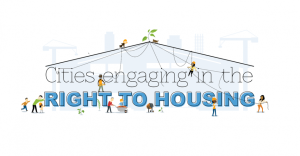A GLIMPSE into the EUROPE HOUSING FORUM – Habitat for Humanity International
From the 16th to the 19th of November, Habitat for Humanity International organized the Europe Housing Forum, aimed at virtually bringing together experts in the housing sector to learn, debate and share insights on housing as a driver for sustainability and economic growth. The initiative witnessed the participation of diverse stakeholders and practitioners engaged in the topic of decent, affordable, and environmentally sustainable housing, including policymakers, researchers, international organizations, housing finance organizations, and civil society representatives. Tesserae has been honoured to take part, with Laura Colini participating in the forum session facilitated by Michalea Kauer, dedicated to the New European Bauhaus and the EU Affordable Housing initiative.
Tesserae followed the proceedings of the forum closely and this report is a short glimpse into the very rich two day event.
The forum started by framing the new dimensions of access to housing that have come about in the aftermath of the COVID-19 pandemic, and its global impact on housing. The speakers highlighted the importance of thinking about which effective measures and policy responses should be taken to tackle the negative impacts of the pandemic, especially on low-income households, homeless populations, tenants, and builders while improving housing affordability, adequacy, and resilience.
The second day of the Forum presented panels and roundtables on topics such as the impact of climate change on vulnerable populations, housing innovation, homelessness in Central and Eastern Europe and the role of public-private-people partnerships in promoting social and affordable housing opportunities. Housing Europe Observatory director Alice Pittini, speaking about the state of housing in Europe, said that “Affordable housing represents one of the toughest challenges of our times, together with the need for improvement of housing conditions for specific groups, housing quality and energy efficiency”. Pittini then introduced #Housing2030, a joint international initiative showing how policymakers can improve affordable housing outcomes and at the same time play a role in addressing climate change and stimulating recovery from the pandemic.
The third day focused on energy poverty – an issue included by the European Union in some of its initiatives, such as the Renovation Wave – and how to combine energy and social policies to address it. The most vulnerable populations and low-income households in Europe have continuously suffered from energy poverty, whose cause can be related to poor quality construction of homes, lack of access to energy provision, privatization of the energy market, etc. In the face of the COVID-19 pandemic, conditions have become increasingly harsh, and it is key that recovery policies and measures provide an effective framework to promote improvements and alleviate energy poverty in the long run.
Barbara Steenbergen, head of the EU liaison office, International Union of Tenants (IUS), highlighted the main bottlenecks in housing renovations, as in most EU countries those costs can be directly passed to the tenants, fully or partially, by the homeowners. “Housing cost neutrality (including rents, energy cost and local taxes) should be at the principle of the EU Green Deal!”. A Climate Allowance might also represent a concrete form of help for low-income households, which could very easily be incorporated into already existing housing allowances. Steenbergen also called for minimum energy performance standards and rent caps to be placed on buildings which do not reach expected standards and on those which receive funding, to prevent funding capitalization.

The closing session on the New European Bauhaus and the Affordable Housing Initiative, both of which see housing at the core of the principle of social Europe, showcased new actions of the EU commission. In particular, the Affordable Housing Initiative, which will pilot 100 lighthouse projects, promises to deliver not only on low energy efficiency and affordable housing, but also better and more liveable neighbourhoods where citizens are at the centre of the decision making process. “The EU Com initiatives are promising and largely welcomed, and they are inspired by the pragmatic innovation happening at city level”, said Laura Colini, referencing examples from the URBACT/UIA platform www.right2housing.eu. Taking the perspective of cities, Laura said that “Contradictions exists in the way policies are designed at different government levels and implemented locally. Moreover, many EU National member states might be politically blind, refusing to invest in public social housing, not to mention that there is a risk of capitalization on the new wave EU funding, favouring financialisaton of the housing sector. Hence the above mentioned initiatives might not be enough if those challenges are not politicised and taken into account”.
The closing remarks of Michaela Kauer pointed out that the gender dimension of housing still represent a major challenge. The gender pay gap in Europe shows soaring imbalance, which dramatically affects the housing sector.
Greater attention to the gender perspective is a must for the new EU investments.

